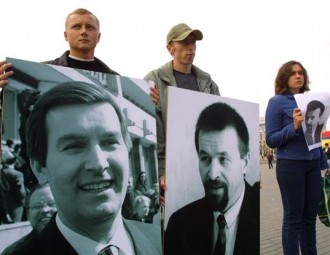15 years ago Hanchar and Krasouski were kidnapped

September 16 marks 15 years since Lukashenka’s political opponents were kidnapped.
On September 16, 1996 an opposition politician Viktar Hanchar and a businessman Anatoly Krasouski completely disappeared in Minsk.
They went to a bathhouse in Fabrychnaya Street in the evening. They were last seen at around 22:35, when both left the bathhouse and got into Krasouski's Jeep Cherokee, informs charter97.org.
According to the investigation, fragments of plastic lamp lenses, traces of braking and hitting a tree and traces of blood were found at the scene. A genotype test showed that the origin of the traces of blood from Krasouski is excluded, and the reliability of conclusions that the blood belongs to Hanchar is 99.6%. The analysis of the evidence in the case, including the testimony of witnesses, suggests that Hanchar and Krasouski were forcibly abducted by unknown persons.
Opposition members, relatives of the missing persons and the international community believe that Hanchar and Krasouski were kidnapped for political reasons, and suspect the country's high-ranking officials of involvement in the kidnapping.
Meanwhile, the statute of limitation in the criminal cases over the disappearance of the opposition members expires this year.
A U.S. State Department official says Belarus should extend the statute of limitations on the investigation into the disappearance of Lukashenka’s opponents.
The U.S. government remains "deeply concerned with the fate" of Viktar Hanchar and Anatoly Krasouski after they vanished in 1999, the official told RFE/RL on condition of anonymity.
"We...call on the Belarusian authorities to thoroughly investigate their disappearances by extending the statute of limitations and starting a transparent investigation," the official said. "The families of the disappeared deserve justice."
A rapporteur from the Parliamentary Assembly of the Council of Europe (PACE) concluded in 2004 that senior Belarusian officials "may themselves be involved" in the disappearances and that "steps were taken at the highest level of the state to actively cover up the true background" of their vanishings.
The comments by the State Department official follow an appeal by Krasouski's widow, Irina Krasouskaja, and Washington-based activists to U.S. Secretary of State John Kerry last month.
In the August 27 letter, they called on the United States to urge Minsk to "thoroughly investigate" the disappearances of Hanchar, Krasouski, Zaharanka, and Zavadski, as well as issue a public report with the findings of the investigation.
The State Department official declined to comment on any "diplomatic correspondence" the U.S. government may have had with Belarusian officials about the disappearances but said Washington "continues to call for the immediate and unconditional release of all political prisoners and the restoration of their political and civil rights."
"Enhanced respect for democracy and human rights in Belarus remains central to improving bilateral relations and is essential to the progress of the country and its citizens," the official said.
In the run-up to Solidarity Day on September 16 leaflets with the portraits of the disappeared were placed in central Grodno – on the posts, public transport stops and notice boards.
-
03.01
-
07.10
-
22.09
-
17.08
-
12.08
-
30.09








































